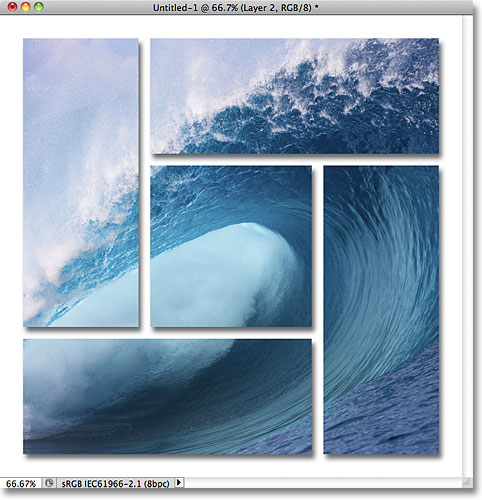
In this Photoshop tutorial, we’ll learn how to display a single photo as a cluster of shapes, similar to larger "wall cluster" displays where several photos, usually in different frame shapes and sizes, are arranged together on a wall to form a larger design. In this case, we’ll use Photoshop to create something similar but on a smaller scale using just a single image.
Download our tutorials as print-ready PDFs! Learning Photoshop has never been easier!
Here’s what the final result will look like:
The final result.
Let’s get started!Step 1: Create A New Document
Let’s begin by creating a new Photoshop document. Go up to the File menu in the Menu Bar along the top of the screen and choose New: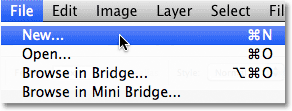
Go to File > New.
This opens Photoshop’s New Document dialog box. A square-shaped document works best for this effect, so I’ll set both the Width and Height of my document to 1000 pixels, and since I’m not planning on printing this, I’ll leave the Resolution value set to 72 pixels/inch. The dimensions and resolution you need may be different, especially if you’re creating this for print. Set the Background Contents to White, then click OK to close out of the dialog box. A new document, filled with white, will appear on your screen: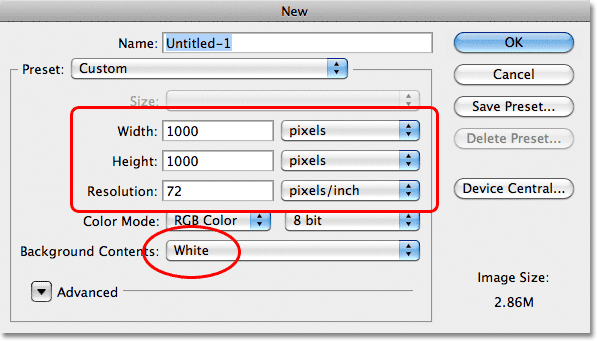
Set the Width and Height to 1000 pixels, the Resolution to 72 pixels/inch, and the Background Contents to White.
Step 2: Change The Grid Size In Photoshop’s Preferences
We’re going to use Photoshop’s grid to help us create our shape design, but first, we need to make a change to the size of the grid, and we do that in the Preferences. On a PC, go up to the Edit menu at the top of the screen, choose Preferences, then choose Guides, Grid, & Slices. On a Mac, go up to the Photoshop menu, choose Preferences, then choose Guides, Grid, & Slices: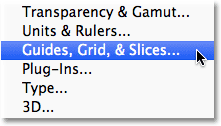
On a PC, the Preferences are found under the Edit menu. On a Mac, they’re under the Photoshop menu.
This opens the Preferences dialog box set to the Guides, Grid and Slices options. In the Grid section, set the Gridline Every option to 2.5 percent. Leave the other options set to their defaults. Click OK when you’re done to close out of the dialog box:
Set Gridline Every to 2.5 percent in the Grid section.
Step 3: Turn On The Grid
We’ve changed the size of the grid, but we still need to turn the grid on in our document. To do that, go up to the View menu at the top of the screen, choose Show, then choose Grid:
Go to View > Show > Grid.
The grid is now visible in the document. Even though we can see it,
the grid isn’t actually part of the design. It’s just there for visual
reference to help us out: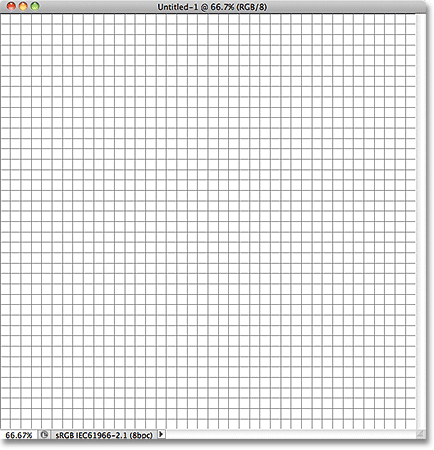
The document with the grid turned on.
Step 4: Add A New Layer
Click on the New Layer icon at the bottom of the Layers panel:
Click on the New Layer icon.
This adds a new blank layer named “Layer 1″ above the Background layer: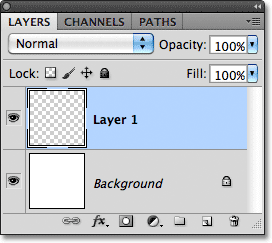
Photoshop adds a new layer and names it “Layer 1″.
Step 5: Select The Rectangular Marquee Tool
Select the Rectangular Marquee Tool from the Tools panel:
Selecting the Rectangular Marquee Tool.
Step 6: Draw An Initial Selection Around The Grid
With the Rectangular Marquee Tool selected, draw an initial selection outline around the grid, but leave a border the width of two squares between the selection outline and the edges of the document. The selection outline can be a bit hard to see in a screenshot, so I’ve highlighted mine in red just to make it easier to see that I’ve left a border two squares thick around it: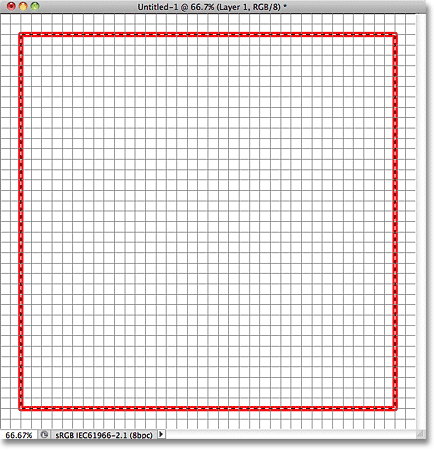
Draw a selection outline around the grid, leaving a border two squares thick around the edges.
Step 7: Fill The Selection With Black
With the selection in place, go up to the Edit menu at the top of the screen and choose Fill: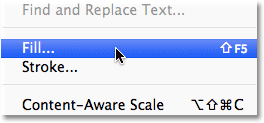
Go to Edit > Fill.
This opens Photoshop’s Fill dialog box. Change the Use option at the top of the dialog box to Black: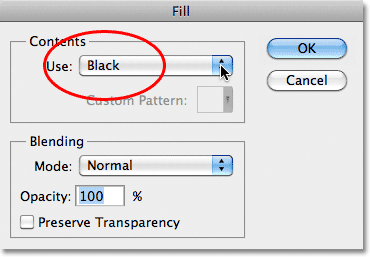
Change the Use option to Black.
Click OK to close out of the dialog box. Photoshop fills the
selection with black in the document. We don’t need the selection
outline anymore, so to remove it, go up to the Select menu at the top of the screen and choose Deselect. You could also press Ctrl+D (Win) / Command+D (Mac) to quickly deselect it using the faster keyboard shortcut: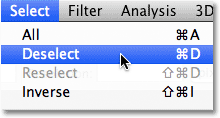
Go to Select > Deselect to remove the selection outline from around the black-filled area.
You should now have an initial black-filled square shape in the
document. It really makes no difference which color we chose to fill the
selection with since the photo will eventually appear overtop of it. I
chose black simply because it’s easy to see in front of the white
background and it also makes it easy to see the grid lines: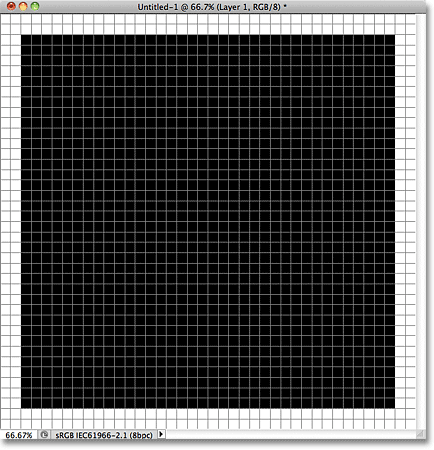
The initial black-filled shape.
Step 8: Draw A Series Of Narrow Rectangular Selections
We’re going to divide our initial shape into several smaller shapes, and we’ll do that by deleting parts of it. First, we need to select the areas we’re going to delete. With the Rectangular Marquee Tool still selected, start from the left side of the shape and count out 10 vertical columns of squares inward towards the right, then start at the top of the shape and draw a selection down around the 11th column, but leave 10 squares between the bottom of your selection and the bottom of the shape. I realize that can sound confusing so I’ve tried to make it clearer in the screenshot by once again highlighting my selection outline in red. Notice that my selection is just one column wide and that there’s 10 squares between my selection and the left side of the shape, as well as 10 squares between the bottom of my selection and the bottom of the shape: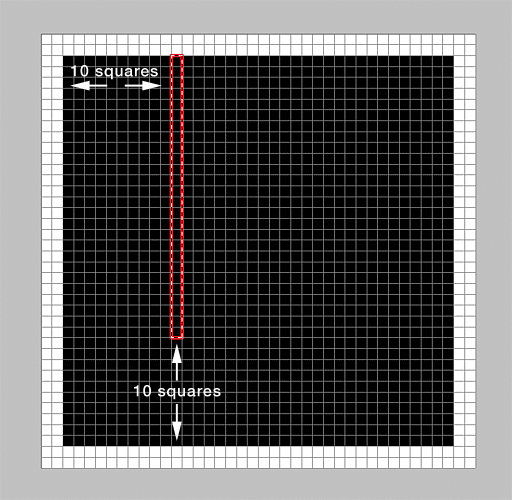
Draw a selection around the 11th column of squares from the left, leaving 10 squares at the bottom unselected.
Once you’ve drawn the first selection, hold down your Shift key, which will temporarily switch you into Photoshop’s Add to Selection
mode, then count out 10 horizontal rows of squares upward from the
bottom of the shape and draw a similar selection around the 11th row of
squares starting from the left, leaving 10 squares between the right
edge of your selection and the right side of the shape. Again, the
screenshot hopefully makes it easier to see. By holding down the Shift
key, this second selection is added to the first, and we now have parts
of one column and one row of squares selected: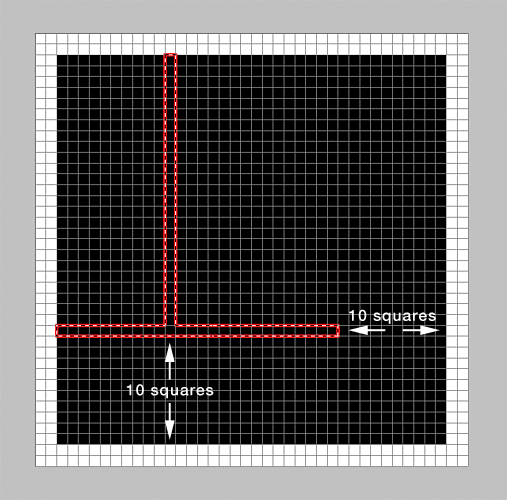
Hold Shift and draw a selection around the 11th row of squares from the bottom, leaving 10 squares on the right unselected.
Two selections down, two more to go. Continue holding down your Shift
key, then count out 10 columns of squares from the right side of the
shape and draw a selection upward around the 11th column, leaving 10
squares between the top edge of your selection and the top of the shape.
This third selection is added to the first two: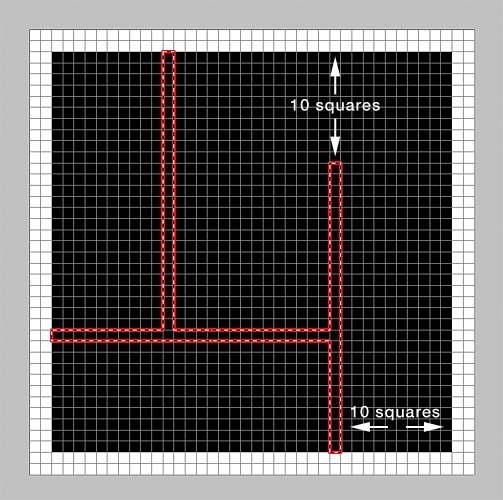
Again hold Shift and
draw a selection around the 11th column of squares from the right,
leaving 10 squares from the top unselected.
Finally, with the Shift key still held down, count
out 10 rows of squares from the top of the shape and draw a selection
around the 11th row, beginning from the right of the shape, leaving 10
squares between the left edge of your selection and the left edge of the
shape. When you’re done, you should have parts of two rows and two
columns of squares selected: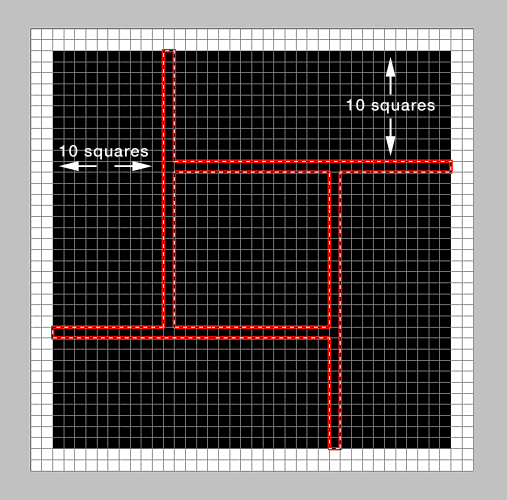
Hold Shift and draw a selection around the 11th row of squares from the top, leaving 10 squares on the left unselected.
Step 9: Delete The Selected Areas
Press Backspace (Win) / Delete (Mac) on your keyboard to delete the selected areas of the shape, which instantly separates the larger shape into five smaller shapes. Press Ctrl+D (Win) / Command+D (Mac) to quickly remove the selection outlines from around the shapes. We no longer need our grid displayed in the document, so go back up to the View menu, choose Show, then choose Grid to turn the grid off. You could also press Ctrl+’ (Win) / Command+’ (Mac) to turn it off with the faster keyboard shortcut. Here’s what the document now looks like after removing the selection outlines and turning off the grid: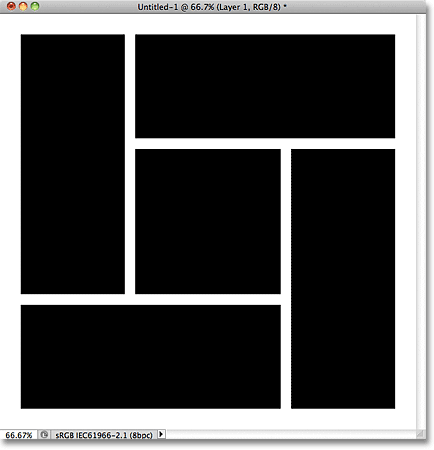
The initial larger shape has been divided into five smaller shapes.
Step 10: Add A Drop Shadow
Click on the Layer Styles icon at the bottom of the Layers panel:
Clicking on the Layer Styles icon.
Choose Drop Shadow from the list of layer styles that appears: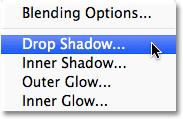
Choose Drop Shadow.
This opens Photoshop’s Layer Style dialog box set to the Drop Shadow options in the middle column. I’m going to set the Angle of the shadow to 120° and I’ll set both the Distance and Size to 12 px.
You may need to use different values for the Distance and Size options
if you created a larger document than the size I’m using for this
tutorial. Finally, to reduce the intensity of the shadow, I’ll lower the
Opacity value down to 60%: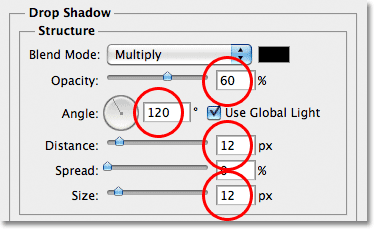
The Drop Shadow options in the Layer Style dialog box.
Click OK to close out of the Layer Style dialog box. A drop shadow is now added to the shapes: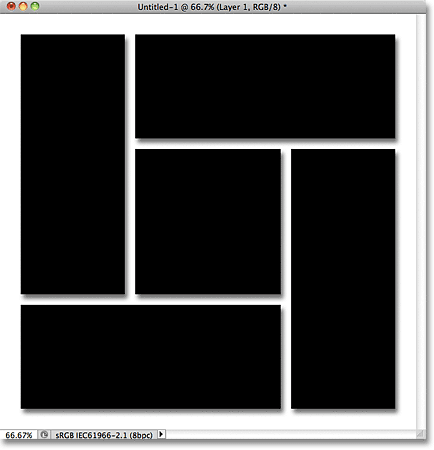
The image after adding the drop shadow.
Step 11: Open Your Photo
Open the photo you want to place inside the shapes. It will open in its own separate document window. Here’s the image I’ll be using:
The original image.
Step 12: Copy And Paste The Photo Into The Shapes Document
Press Ctrl+A (Win) / Command+A (Mac) to quickly select the entire photo, then press Ctrl+C (Win) / Command+C (Mac) to copy it to the clipboard. Switch over to your shapes document, then press Ctrl+V (Win) / Command+V (Mac) to paste the photo into the document. It will appear on its own layer (Layer 2) above the shapes layer (Layer 1) in the Layers panel: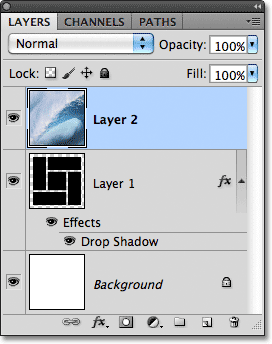
Photoshop places the image on its own layer above the shapes layer.
Step 13: Create A Clipping Mask
Go up to the Layer menu at the top of the screen and choose Create Clipping Mask: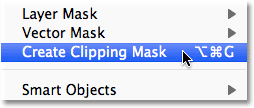
Go to Layer > Create Clipping Mask.
This “clips” the photo to the shapes on the layer directly below it,
creating the illusion that the photo is being divided up and displayed
on the shapes: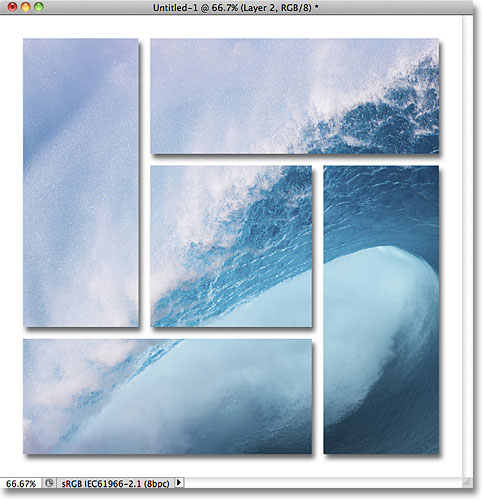
The effect after clipping the photo to the shapes.
If we look in the Layers panel, we see that Layer 2 is now indented
to the right with a small arrow on the left of the preview thumbnail
pointing down at Layer 1 below it. This is Photoshop’s way of letting us
know that Layer 2 is now clipped to the contents of Layer 1: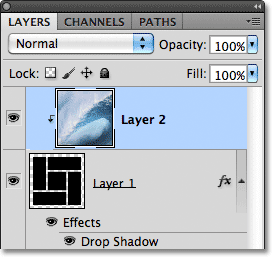
Photoshop indents layers that are clipped to the layer below them.
Step 14: Move And Resize The Photo With Free Transform
To resize and reposition the photo inside the shapes, go up to the Edit menu at the top of the screen and choose Free Transform, or press Ctrl+T (Win) / Command+T (Mac) to select the Free Transform command with the keyboard shortcut: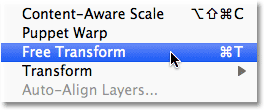
Go to Edit > Free Transform.
This places Photoshop’s Free Transform box and handles around the
photo. Even though we can only see the area of the photo that sits above
the shapes, the Free Transform box and handles will appear around the
photo’s actual size. If you can’t see the handles because the
photo is too large and extends outside the current viewable area of the
document, go up to the View menu at the top of the screen and choose Fit on Screen. You can also press Ctrl+0 (Win) / Command+0 (Mac) to select the Fit on Screen command with the keyboard shortcut: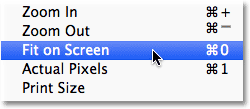
Go to View > Fit on Screen.
Photoshop will instantly zoom out as far as needed to fit the entire
photo into the document’s viewable area so you can access the Free
Transform handles. To resize the photo, hold down your Shift key, which will constrain the aspect ratio of the photo as you resize it, then drag any of the four corner handles
(the little squares). To move the photo, simply click anywhere inside
the Free Transform bounding box and drag the image around with your
mouse. As you resize and reposition the image, you’ll see it moving
around inside the shapes: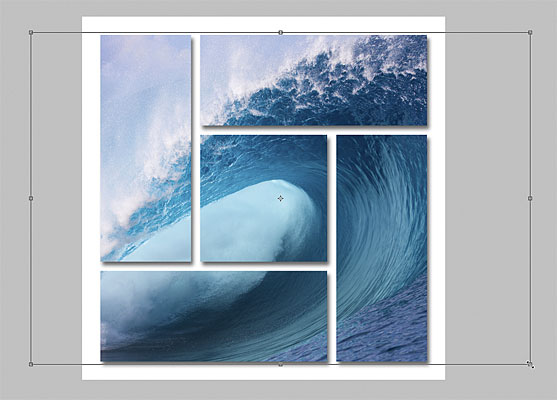
Resize and reposition the image inside the shapes as needed.
When you’re happy with how things look, press Enter (Win) / Return
(Mac) to accept the changes and exit out of Free Transform. And with
that, we’re done! Here is my final “shape cluster photo display” result:
Hope you enjoy
it &learn something new from this tutorial.
Determinebest
quality clipping path, clipping
path service, low cost clipping path or photoediting&image
masking service
from Clipping Design. Clipping Design always assurephotoshopmasking, image
editing service
at quick turnaround time with Guaranteed client satisfaction on top quality SEO service. You can also discover 100% handmade clipping path&clipping path service in reasonable price.
Thank you…
Reference: photoshopessentials
No comments:
Post a Comment